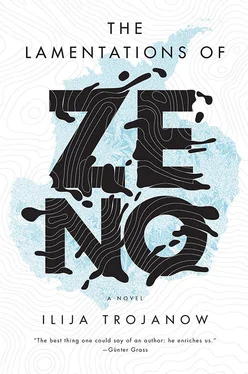On a ship at sea it’s hard to get out of the way, the passageways are straight and narrow, it’s best to stop and turn so you’re back is against the wall, pull in your stomach and don a broad smile that makes it easy for the other person to glide past. Everyone on board is quickly located: within a few days it’s clear who has set down roots where, which binoculared guest has staked out which spot in the hope it will content him throughout the trip, an armchair in the crow’s nest of the Panorama Lounge, for instance, where it’s easiest to escape the ones who can’t keep still, who change positions every fifteen minutes, heading now to the weather deck now to starboard now to port because they’re afraid of missing something, who soak up every scenic view and then rush back inside where it’s warm, on to the next lecture, the next film, to coffee or afternoon tea. And those who have paid a great deal of money for a top-of-the-line suite may under no circumstances be disappointed. Emma at the reception desk tells me that no one can teach the art of complaining as well as rich people. As Expedition Leader I am fair game for the restlessly inquisitive, passing from Deck 3 to Deck 6 is like running a gauntlet of questions. I prefer sitting in the bistro, where every second table has a jigsaw puzzle — postcard scenes, carved into 500 tiny pieces waiting to be put back together so as to match the picture on the box, and whoever succeeds can graduate to 1,000 or 1,500 pieces, clearly all puzzle-piecers must be happy people. I sit down at one of the tables for two, across from Mary, who keeps her recording device running even while she sketches away in her unlined notebook with a sharpened pencil, the Antarctic Ocean is on my left, and on my right is Paulina, who plays the part of the indifferent waitress with furtive joy, repeating my order with intense concentration, as though it were the first time she’d heard me ask for a double espresso with a good dose of foamed milk, but foam only please, so as not to drown the taste of the coffee in a lot of milk, she recommends the marble cake which I detest, whereupon Mary orders a slice just out of solidarity. We have just crossed the 60th parallel, I explain, only now are we truly in the Antarctic, from this point on ships aren’t allowed to dump waste water, which naturally limits the length of our stay in these latitudes, an additional advantage of this sensible regulation, after all this is the only ocean humans still haven’t polluted, and that’s the way it ought to remain. Just four percent, says Mary, while I take a swallow of water, the Antarctic Ocean makes up only four percent of the Earth’s surface water. Outside, a flock of cape petrels floats past on invisible pillows of air. Paulina serves the coffee and cake with an air of professional efficiency and practiced nonchalance. Mary thanks her by name, which she reads off the tag pinned over Paulina’s breast pocket. Paulina responds with an exaggerated smile before turning to me and asking, “Anything else, sir?” Whereupon I answer stiffly, “No that will be all, Paulina, thank you.” Mary asks what I think would happen if it weren’t for the Antarctic treaty. “There’d be a public discussion about the exploitation of the Antarctic and lots of bargaining behind the scenes. Lobbyists would stress the need for mining and oil exploration, and a campaign would be launched against the penguins with the slogan ‘Should we give up flying just because these birds don’t know how?’ The penguins would no longer be photographed standing up but lying down, so that they looked plump and a bit dodgy, as though they were begging to be slaughtered. We can give up the luxury of our sentimentality at any moment, and there’s no guarantee this won’t happen prematurely, despite the treaty, when the going gets tough, who’ll pay attention to voluntary obligations when even binding treaties don’t count for much.”
“A whole lot of people would have to exert pressure to keep that from happening.” Mary interrupts me with a naïve enthusiasm that does my heart good and hurts at the same time, my face betrays my skepticism. I might excuse her remark, thinking how weighed down I must seem, perhaps, she says, it’s because I lack the experience of a common struggle that would give me courage, I would like to forgive her, but she really shouldn’t say that. I yearn to feel euphoric. We go on talking about ice and the world, she asks questions that require answers beyond the usual prepared platitudes, and all of a sudden I hear myself confessing how I sometimes feel ashamed to be working on this ship, especially on this trip when I’m even more responsible because I’m Expedition Leader, the tourists should be sent elsewhere, to a theme park, to a traveling Capsule of Eternal Ice that can be set up anywhere, you enter through the front and leave by the back, but I myself couldn’t live without my sojourns in the ice, and she looks at me so full of understanding that I tell her about my theory of mass hyperthermic cognitive dysfunction, a syndrome with symptoms that mirror those of hypothermia when overexposure to cold addles the mind to the point that people freezing to death suddenly feel warm and start taking off their clothes. This paradoxical undressing is known as hypothermic cognitive dysfunction, and sets in when the body temperature drops below 90°. And while we have scientific proof that people in this state lose their ability to think and therefore to save themselves, I don’t know of a corresponding temperature threshold marking the onset of the hyperthermic equivalent. But it’s obvious that our collective mind is similarly addled, since we keep turning up the temperature on a planet that’s already unbearably hot. Mary seems bewildered, suddenly she’s avoiding my eyes — does she consider my theory stupidly silly or simply smug? — she stares off to the side, or have I alienated her in some way? The way you trumpet out your so-called convictions, Helene once snarled at me while we were fighting, makes them sound like insults. Mary doesn’t react to my soothing chatter, her gaze is paralyzed, focused on a point at the other end of the room. Her face goes blank, surely it’s not my fault, and it’s hard to imagine that the sight of the small, husky man stretched out in one of the armchairs and fingering a book and staring off dreamily might have hijacked her attention like that. “Mary, what’s the matter?” Her face has broken out in splotches of red. It takes a while before she answers me. “That man, what’s he doing here, what does he want?” Before I can ask another question she has stood up and scurried off, leaving her paperback and recorder in my care.
My sadness scabbed over into rage. The semester hadn’t yet begun, it was easy to avoid running into people. Helene pounced on every invitation and stayed out of the house as long as she possibly could, assiduously representing the two of us, she even drove out to her mother’s by herself to celebrate a round-numbered birthday, I don’t know if she concocted something about a present being from the two of us. How long might it have gone on until everyone simply forgot she was actually part of a couple? Whoever believes in constancy and steadfastness must despair at the rapidity with which individuals couple and their unions break apart. At first acquaintance, the other person is an impregnable fortress, three dates later, after a few kisses and some mediocre sex which both sides sugar-coat, all drawbridges are let down. The lie of eternal love attunes us to the lie of eternal life. Later we have a hard time explaining what the fuss was all about. During my first weeks alone I conducted an experiment on myself, with curtains drawn and lights dimmed I sat on the floor and resolved not to get up until I had recalled half a dozen sexual delights in exact detail — something more substantial than the faded memory of a breeze wafting across our bodies or velvet-soft skin. But even after hours of biographical excavation I couldn’t do it. Instead, my brain called forth athletic achievements as vainly as I had stored them: three times in a night (in the ski lodge, as a student), two hours without stopping (to win a bet with Helene when she claimed I didn’t have the stamina). At some point I had to get up and get groceries. Every acquaintance I came across inquired with urgent concern about my convalescence. I disappointed them all. Instead of sharing some uplifting tale of my narrow escape from death, I told them about a glacier that had been exterminated, and that annoyed the good souls, they walked away shaking their heads and rendered disparaging judgments before they even reached their cars and drove down dead-straight streets into their remotely controlled garages and from there quietly ascended in paneled elevators up to their wallpapered crypts. They considered me ungrateful, either toward God or fate or the health system. “Well well, here I thought we’d lost you but I see you’re still alive and kicking,” the vegetable peddler pontificates — the same man who charges a lot more money for just a little more taste. It’s uncanny how orderly everything is in Solln, and how resolutely the Blessed defend their idyll with all myopic means. My neighbor pesters me with an account of his illness, as if we owed each other some reciprocal sympathy. “Just because our pain is similar doesn’t mean our suffering’s the same,” I told him, and that was the end of his pestering concern. What a happy circumstance that people quick to interfere are so quick to be insulted. Unfortunately this kind of self-disclosure wasn’t an isolated case, lingering illnesses were being tooted and touted on every channel and frequency, as if contracting a severe disease were the most remarkable individual achievement of our era. You have cancer, how extraordinary, prostate or breast or lung or liver, you have ulcers, how exceptional, your body is wasting away, oh my, it’s being consumed from within, how astounding. The sunniest beaches are littered with melanomas, this obsession with one’s own miniscule existence is nothing more than pitiful, what bloody fucking miserable bastards. “Hey, I understand that,” Paulina interrupts my jotting. “German’s a lot like English, isn’t it?”— because those last words I’ve just written in English. Paulina loves looking over my shoulder (like she’s doing now) and especially loves it when she recognizes what I’m writing, even if it’s some crude obscenity like that. I hardly notice the English words sprinkled in, here it’s rare that we native speakers of German are all to ourselves, so my German is becoming anglicized step by step. To prevent me from suffering the same fate as my first expedition leader, who jumbled English and German into a kind of gobbledygook, and to keep my own language crystal clear, I often retreat to the weather deck and mumble poems to myself that I learned in my youth, poems our teacher Herr Stradel assigned us in the Frühlings Gymnasium, which we wound up learning by heart (in my case on my way back from school), without a clue that they would stay with us forever.
Читать дальше












